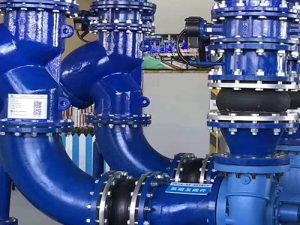Phone: (+86)13526688380
WhatsApp/WeChat: (+86)13526688380
Need help or have a question?
Contact us at: info@jpsgy.com
Xicun Village, Xicun Town, Gongyi, Henan, China (Mainland)
Phone: (+86)13526688380
WhatsApp/WeChat: (+86)13526688380
Need help or have a question?
Contact us at: info@jpsgy.com
Xicun Village, Xicun Town, Gongyi, Henan, China (Mainland)

Water treatment plants play a vital role in the supply, purification, and distribution of water. The pipeline system within these plants is essential for transporting water and processing it, and rubber expansion joints have become an indispensable component in ensuring the system’s efficiency and longevity. Rubber expansion joints not only effectively compensate for stresses caused by temperature fluctuations, pressure variations, and water flow vibrations but also reduce noise and extend the lifespan of pipelines and equipment. This article explores the application and advantages of rubber expansion joints in water treatment plants.
Reducing Vibration and Noise from Water Flow
Pumps, pipes, and other mechanical equipment in water treatment plants generate vibrations, especially in systems with high flow rates and pressure. Rubber expansion joints have excellent vibration-damping properties, effectively isolating and reducing vibrations, which in turn minimizes noise pollution in the plant and surrounding areas, providing a quieter working environment.
Reducing Pressure Stress on Pipelines
Water treatment plant pipelines are often exposed to high internal and external pressures, particularly at bends, joints, and valve points. Rubber expansion joints effectively reduce the stress caused by pressure fluctuations, preventing the pipeline from cracking or rupturing due to excessive pressure buildup.
Corrosion and Wear Resistance
The water in treatment plants may contain corrosive substances due to chemical additives or other factors. Rubber expansion joints made from corrosion-resistant materials can withstand these harsh conditions, providing long-term protection to the pipeline system by preventing aging, cracking, and failure caused by corrosion or wear.
Improving Safety and Reliability of Water Treatment Systems
Given that water treatment plant pipelines often operate under high pressure and flow conditions, maintaining system stability and safety is crucial. Rubber expansion joints effectively compensate for temperature variations and water flow-induced vibrations, reducing the risk of pipeline damage and improving the overall reliability of the water treatment system, which helps avoid disruptions in water supply or quality.
Energy Efficiency and Environmental Benefits
Rubber expansion joints contribute to the efficient operation of the water treatment plant by optimizing the flow of water through the pipeline system. They help reduce energy loss due to vibrations and pressure fluctuations, making the system more energy-efficient and environmentally friendly.
Strong Adaptability
Rubber expansion joints are highly versatile and can be used in both low and high-pressure pipelines. They provide excellent compensation and vibration isolation, and can be customized to meet the specific needs of the water treatment plant’s pipeline systems.
Pump Station Connecting Pipelines
In water treatment plants, pumps are responsible for moving water, and their operation generates significant vibration. Rubber expansion joints are used in pump station pipelines to isolate the vibrations generated by the pumps, preventing excessive wear on the pipes and reducing the risk of leakage.
Inlet and Outlet Pipelines
Rubber expansion joints are widely used in the inlet and outlet pipelines of water treatment plants. During the intake process, the water flow often undergoes significant changes in speed and pressure. Rubber expansion joints absorb these fluctuations, ensuring the stability of the pipeline system and preventing pressure-related damage.